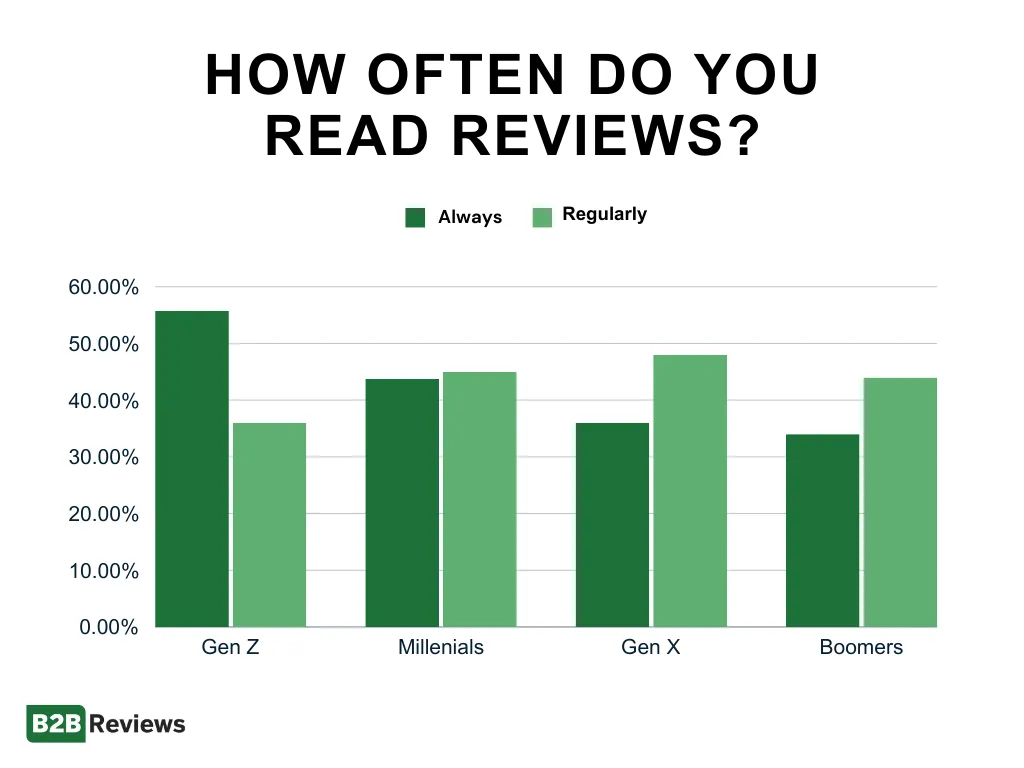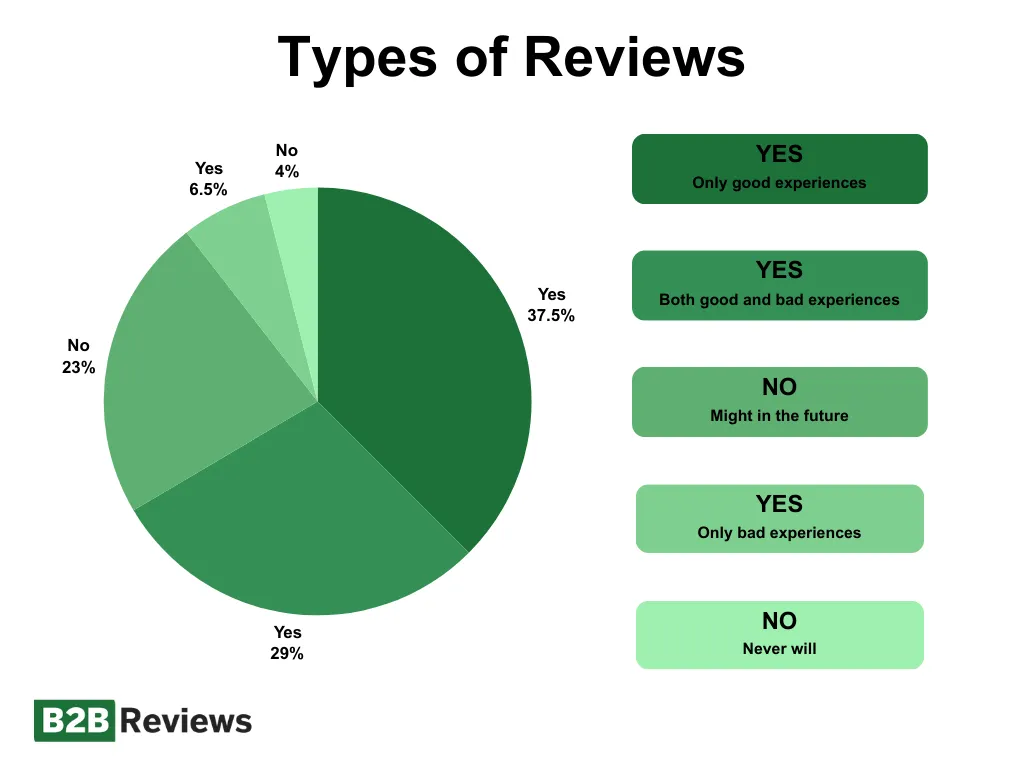We may earn money when you click on links to our partners. Advertiser Disclosure
Since the dawn of the internet, consumers have had access to thousands more products and services than ever before. Online businesses are more common than ever, allowing consumers to purchase products faster and more conveniently. However, with this onset of online shopping and exposure to an overwhelming number of products and services, consumers must make smart choices, researching the products to ensure they get the best for their dollar. Gone are the days when American consumers trusted commercials or marketing campaigns.
A 1986 study by Robertson and Gatignon stated that potential customers often rely on the experience and opinions of other users to make purchasing decisions in order to avoid functional risks. Without proper knowledge or understanding of a new product, customers lack the framework to evaluate it properly. This need is still true in today’s digital landscape, and online customer reviews are the avenue potential users take to learn about a product.
We wanted to know just how important online reviews are for modern businesses. In order to get a better understanding, we went to the experts to get the latest statistics and find out how many people read online reviews before buying a product online.
Key Takeaways
- 99.5% of shoppers read reviews to research online purchases.
- 82% of consumers consult online reviews for local businesses.
- 49% of consumers trust reviews as much as personal recommendations from friends and family.
- 77% of consumers specifically look for websites that have ratings and reviews.
- 94% say reviews have made them avoid a business.
Online Reviews Statistics
In a world where consumers have thousands of options to choose from (many of which are not of equal value or quality), people want to know they are buying a good product. So, people are turning to online testimonials from real users around the world.
- 99.5% of online shoppers read reviews to research purchases at least sometimes.
- Nearly 87% do so regularly or always.
- 78% of consumers say the more expensive the product, the more reviews they read.
- 98% of buyers are more likely to read reviews for a product they’ve never purchased before.
- 82% of consumers consult online reviews for local businesses.
- 31% of people said they read more reviews during the COVID-19 pandemic.
These reviews hold more power than businesses might initially think:
- 49% of consumers say they trust reviews as much as personal recommendations from friends and family members.
Some review platforms allow buyers to post photos and videos of the product, giving potential buyers a chance to see what the product actually looks like in person. This user-generated content brings validity to the product, building trust in the shopper.
- 77% of consumers trust user-generated imagery.
- 60% of consumers look for user-generated content to learn about products they’ve never bought before.
Reviews are critical to reputation management, especially for small businesses that have to compete with large corporations. However, there is an interesting fact between positive reviews and negative reviews. One might think that a lack of negative online reviews is a good thing, but this proves to be false.
- 82% of people specifically search for bad reviews to gain a better understanding of what to expect from your product or service.
If a business has an overwhelming number of positive testimonials, consumers may suspect that you paid people to leave fake reviews. In fact, a study found that consumers trust negative reviews more than they do good reviews. The study also found that consumers have a bias and tend to assume positive reviews might be fake. So, having negative reviews can bring validity to your business.
You don’t want to ignore these bad reviews, however. The Service Corps of Retired Executives (SCORE) recommends that, when possible, businesses should always try to respond to every online review about their businesses, both good and bad ones. Ignoring reviews can tell potential customers you don’t care about them or whether they have a positive experience.
Who Reads Reviews?
Pretty much anyone who shops online reads reviews, at least some of the time. However, some age groups are more likely to read reviews than others. A study by PowerReviews found that younger shoppers are more likely to read reviews than older shoppers.
- 55.75% of Gen Z always read online reviews.
- 43.75% of Millennials always read reviews.
- 36% of Gen X always read reviews.
- 34% of Boomers always read reviews.

Some consumers specifically seek out reviews before making a buying decision. The percentage of people who do this varies by generation.
- 87% of Gen Z specifically look for reviews.
- 81% of Millennials specifically look for reviews.
- 70% of Gen X specifically look for reviews.
- 63% of Boomers specifically look for revie
Younger consumers also place a large value on reviews:
- 91% of 18 to 34-year-olds say they trust online reviews as much as personal recommendations.
When consumers are shopping online, their buying decisions are influenced by many factors. Below are the top things the majority of consumers consider when shopping online:
- 90% consider customer ratings and reviews.
- 73% review customer photos and videos.
- 73% consider recommendations from friends/family.
- 56% evaluate results on Google and similar search engines.
- 48% look at search results on retail sites (e.g., Amazon.com or Walmart.com).
As you can see, the vast majority consider ratings and reviews to be the most important. Encouraging existing and loyal customers to leave reviews online can increase conversion rates and build your business’s online reputation. Luckily, 7 out of 10 customers will leave an online review when asked to by the business, especially if they’ve had a good customer experience.
Where Do People Read Online Reviews?
Consumers face an overwhelming number of websites to shop from, some of which are scams. That’s why it’s no surprise that 77% of consumers specifically look for websites that have ratings and reviews.
When researching products, 54% of consumers almost always or frequently rely on apps and their mobile devices, especially smartphones, for reviews.
Some websites are more popular for consumers to use to read reviews on:
- 94% of consumers read reviews on Amazon.
- 91% of consumers read reviews on retail websites like Target, Walmart, etc.
- 70% read reviews on search engines like Google (this is why SEO optimization is important).
- 68% read reviews on the brand/manufacturers’ websites.
PwC conducted a survey and asked people to rank what they considered to be the top source for pre-purchase information.
- 54% ranked search engines as the top source of pre-purchase information.
- 35% rated the e-commerce aggregator Amazon as the top source.
- 33% ranked the individual retailers’ websites as a main source of information.
- 29% (the majority of whom are Gen Z) ranked price comparison sites as a top source of information.
Many consumers read reviews on different websites when researching a product or service, especially an expensive one. The most common starting place for people is Amazon.
- 50% of consumers start reading reviews on Amazon
- 31.5% start with Google reviews
- 14% start on retail or brand website
- 2% start on a third-party review website
- 2% start on social media
- 0.5% start on a price comparison site
- 0% start on a coupon website
There are many third-party review sites that people use to learn about a business. A great way to improve your business’s average rating and reputation online is to get a good number of business reviews across different sites. You don’t have to get reviews on every single one, but knowing the most popular review platforms will help you build that digital reputation.
Ten most popular review sites for consumers:
- Yahoo!
- Yelp
- Foursquare
- Insider Pages
- Dex Knows
- Merchant Circle
- Super Pages
- Yellow Bot
Managing reviews can become overwhelming, especially on top of every other responsibility you have as a business owner. However, that does not change the fact that reviews are a significant way people decide whether to use your company. Luckily, there are review trackers like Yotpo available that offer review management software.
Importance of Online Reviews
Reviews are more important than ever before. The majority (74%) of consumers use reviews and ratings as a key way to learn about products they’ve never bought before. Reviews have a significant impact on consumer habits.
- 74% of consumers say that reviews increase trust in a company.
- 94% say reviews have made them avoid a business.
Similarly, if a product has no reviews or ratings, 45% of customers will not buy the product—this percentage changes for different generations.
- 58% of Gen Z won’t buy a product without reviews or ratings.
- 48% of Millennials won’t buy if there are no reviews.
- 40% of Gen X won’t buy if there are no reviews.
- 38% of Boomers won’t buy without reviews or ratings.
Another reason reviews are critical is that 56% of consumers don’t trust a star rating alone. They are much more likely to trust a star rating that’s accompanied by a written review. This percentage also differs among the generations.
- 59% of Gen Z feel this way.
- 57% of Millennials feel this way.
- 54% of Gen Xs feel this way.
- 51% of Boomers feel this way.
While your average star rating is important, the number of reviews is just as, if not more, important. Reviews give potential customers a realistic understanding of your product, free from the sales stigma.
Positive online reviews can also help sell your products, especially new ones. Statistics show that new products account for an average of 28% of a business’s sales profit. Despite this, 41% of new products are not successfully promoted.
However, if your business has an excellent online reputation, with good reviews on multiple sites, consumers will likely be more willing to purchase new products. Additionally, 40% of customers who read other’s reviews say they are less likely to return the product.
A Growing Need for Reviews
Product reviews are a relatively new phenomenon in the business world. Before the internet, people learned about products and services through word of mouth or recommendations from friends and family. While those are still important factors, the digital age has given rise to broader recommendations, allowing consumers to get the input and perspectives of hundreds, sometimes thousands, of people.
Over the years, the number of people who specifically look for websites with reviews has increased:
- In 2014, 57% of consumers specifically sought out such websites.
- In 2018, 63% of consumers specifically sought out such websites.
- In 2021, 79% of consumers specifically sought out such websites.
- In 2023, 77% of consumers specifically sought out such websites.
In 2016, only 67% of weekly online shoppers read customer reviews regularly before buying new items. A study that came out in 2018 found that 70% of consumers read online reviews before making purchasing decisions. As you can see, the percentage of consumers utilizing customer reviews has steadily increased for years.
More people are leaving reviews online nowadays. However, some consumers do not regularly or ever leave reviews.
Over the last year:
- 4% of people have not left a review and say they never will.
- 23% have not left one but might in the future.
- 29% have left reviews for both positive and negative experiences.
- 6.5% have left reviews, but only for bad experiences.
- 37.5% have left reviews, but only for good experiences.

The Bottom Line
The statistics demonstrate how important online reviews have become. Businesses that want more loyal customers must enhance their online reputation and presence. The world will only continue into the digital age, and to remain competitive, business owners need to harness the power of reviews.
Almost all (99.5%) online shoppers read reviews at least sometimes, while 87% do so regularly or always. These reviews influence 90% of consumers and prove you’re a real business offering a real product. In fact, 74% of consumers believe that reviews increase trust in a company.
Interacting with reviews is another way to show that your business is present and cares about your customers’ experiences. As a business owner, you don’t need to get all the reviews immediately, but you can start by asking your existing customers to leave a review about their experience. Soon, you will establish your company as a valid and trustworthy service.
- BrightLocal. “Local Consumer Review Survey 2023.” Accessed April 29, 2024.
- Frontiers. “A study on the influence of online reviews of new products on consumers’ purchase decisions: An empirical study on JD.com” Accessed May 2, 2024.
- LocalIQ. “90 Online Review Statistics That Will Blow Your Mind in 2023.” Accessed April 29, 2024.
- Luisa Zhou. “Online Review Statistics: The Definitive List (2023 Data).” Accessed May 2, 2024.
- NPR. “Why we usually can’t tell when a review is fake” Accessed May 2, 2024.
- Pew Research Center. “Online reviews.” Accessed May 2, 2024.
- PowerReviews. “Survey: The Ever-Growing Power of Reviews (2023 Edition).” Accessed April 29, 2024.
- PwC. “Decision points: Sharpening the pre-purchase consumer experience” Accessed May 2, 2024.
- SCORE. “Why Is Your Company’s Online Reputation So Important?.” Accessed May 2, 2024.
